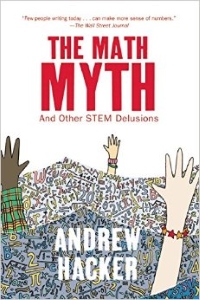 I saw that Andrew Hacker is making the rounds for his new book, The Math Myth: And Other STEM Delusions. In one way, I’m very much in agreement with him. The reason that most people focus on math and science is because they think of them in terms of job training. If you know math, the theory goes, then you will get a good job. I hate this idea. But the problem here is the way people think about science and math — not the subjects themselves.
I saw that Andrew Hacker is making the rounds for his new book, The Math Myth: And Other STEM Delusions. In one way, I’m very much in agreement with him. The reason that most people focus on math and science is because they think of them in terms of job training. If you know math, the theory goes, then you will get a good job. I hate this idea. But the problem here is the way people think about science and math — not the subjects themselves.
Let’s consider STEM for a moment. It is an acronym for Science, Technology, Engineering and Math. These are not the same things. When I was in college, technology and engineering were in the School of Engineering. Physics and math were in the School of Liberal Arts. Right now, University of California, Berkeley has a School of Letters & Science, “Berkeley’s largest college includes more than 60 departments in the biological sciences, arts and humanities, physical sciences, and social sciences.” That’s how people should think of math: the same way they think of history or philosophy.
The problem I see in math is not that it is hard or that people hate it. The problem is that the teaching of it is absolutely horrendous. I used to do tech work over at a church and they had a tutoring program. It didn’t surprise me that the tutors were mostly horrible. But it did surprise me that children were forced not just to solve problems but to solve them in a specific way.
Math, in its natural form, is extremely creative. But our focus on test scores has turned math into the most boring, brain dead thing imaginable.
This is ironic given that I always liked the subject when I was younger because I could approach it in any way that I wanted to. Math, in its natural form, is extremely creative. But our focus on test scores has turned math into the most boring, brain dead thing imaginable. At the same time, when I was a kid, I hated grammar because it was taught in the same way math appears to be taught now.
Math and Grammar
As it is, I’m not very good at knowing the names of things. What I’m really good at is making language work. And the reason for that is because I have my own system for the way English works. But that did me little good in school. A student who knew exactly what an infinitive was and that they should never split one was likely to do very well in school and on standardized tests. I, on the other hand, lump infinitives in with similar constructs and know what works well and what does not.
For example, very few would mark you wrong if you wrote, “He tried to calm the rowdy class down.” But it’s a horrible sentence. It’s the sort of thing that people say but should always avoid writing. It should be, “He tried to calm down the rowdy class.” “Calm down” is a phrasal verb. Splitting phrasal verbs is usually much worse than splitting infinitives. For one thing, I commonly come upon phrasal verb split by ridiculously long objects. For example, “His plan was to take the whole town — the government, the business community, even the schools — over.” But I’ll bet you’ve never been told not to split an phrasal verb — or even what a phrasal verb is.
Math Is Fun
The reason that I know to avoid splitting phrasal verbs is because I find the English language fascinating. But this is not thanks to my English teachers. We have created an educational system that is more focused on social discipline than anything else. And that is the problem. The problem is not that math is hard. I’ll admit: math is hard. And so is English. And so is art and music and theater. Yet people get good at all these things because they are also fun.
The biggest educational problem we have is that we see the purpose of childhood as being preparation for becoming a good adult worker. And that’s what’s going on with the fetishization of STEM subjects. Math is really useful. But that’s not why I love it. But that’s why the Michelle Rhees of the world think that children ought to love it. And that’s why they are destroying education.
Book cover image taken from Amazon, licensed under Fair Use.
 Ever wonder why the economic experts never seem to change, keep coming back, despite racking up such shattering failures as the housing bubble and the financial crisis and the bank bailouts? Ever wonder why a guy like Larry Summers gets to be chief economist at the World Bank, then gets to deregulate Wall Street, then gets to bail Wall Street out, then almost gets to become chairman of the Fed, and then gets to make sage pronouncements on the subject of — yes — inequality? It’s for the same bad reasons: because DC worships expertise and because Summers, along with a handful of other geniuses, are leading figures in a professional discipline dominated by what a well-informed observer once called a “politburo for correct economic thinking.”
Ever wonder why the economic experts never seem to change, keep coming back, despite racking up such shattering failures as the housing bubble and the financial crisis and the bank bailouts? Ever wonder why a guy like Larry Summers gets to be chief economist at the World Bank, then gets to deregulate Wall Street, then gets to bail Wall Street out, then almost gets to become chairman of the Fed, and then gets to make sage pronouncements on the subject of — yes — inequality? It’s for the same bad reasons: because DC worships expertise and because Summers, along with a handful of other geniuses, are leading figures in a professional discipline dominated by what a well-informed observer once called a “politburo for correct economic thinking.”
